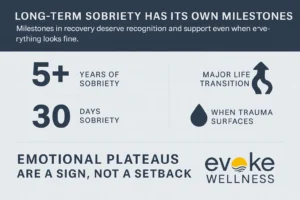You’ve made it farther than you thought you would.
It’s been years since you packed your bags and walked into treatment. You’ve stayed sober. You’ve rebuilt relationships. Maybe you’ve even helped others along the way.
But lately, something feels… off.
You’re not struggling in obvious ways. You’re just numb. A little disconnected. Going through the motions of recovery without feeling the pulse of it anymore.
At Evoke Wellness in Cohasset, we work with long-term alumni who feel exactly this way—solid in their sobriety, but emotionally stuck. The spark that once came with recovery has dimmed. And it’s left them wondering: Is this all there is?
The answer is no. But it might be time to revisit a chapter you thought you had already closed.
Sobriety Isn’t the Final Chapter
Residential treatment tends to mark a powerful beginning. For many, it’s the first time they felt safe enough to tell the truth, to cry in front of others, or to stop numbing every uncomfortable emotion. It’s where healing started to feel possible.
But it’s also where most people assume the story ends.
You graduate, you step back into life, and you’re supposed to keep climbing from there.
So when things feel flat or heavy years later, the shame creeps in. I already did the work. Why am I still feeling this way?
Here’s the truth: feeling disconnected after long-term sobriety is common. It doesn’t mean you’re failing. It means your recovery is evolving—and asking for something deeper.
Emotional Plateaus Are a Sign, Not a Setback
There’s a quiet place in recovery where the chaos is long gone, but the joy hasn’t quite arrived.
You’re doing the things. Meetings. Service. Journals. Gratitude lists. But it all feels routine—like a checklist, not a lifeline.
This emotional plateau often shows up:
- After several years of sobriety
- During major life transitions (parenthood, loss, career shifts)
- When the initial “high” of early recovery fades
- When old trauma starts surfacing in new ways
It doesn’t mean you’re broken. It means your system is telling you, I need something more now. Something deeper.
You don’t need to start over. You need a place to reconnect.
Residential Treatment Wasn’t Just a Phase—It Was a Foundation
Think back to your time in treatment. The early mornings. The uncomfortable truths. The people you cried with. The day you realized, “Maybe I am worth saving.”
That wasn’t just a container for crisis. It was the first time many of us felt safe enough to be ourselves without armor.
And that kind of space? It doesn’t expire. It evolves with you.
When you revisit the core of that experience—whether physically or emotionally—you return to a version of yourself that was open, honest, and brave enough to begin again.
That part of you still exists. And it’s allowed to ask for support.
Disconnection Doesn’t Mean You’ve Lost Your Recovery
There’s a myth in long-term sobriety: once you’ve built a life, you shouldn’t feel lost anymore.
But what happens when the life you’ve built starts to feel too small for the person you’ve become?
One alumnus shared, “I have a good job. A partner. A solid routine. But I miss the rawness of early recovery—the feeling that something real was happening. Now I just feel… removed.”
This isn’t about relapse. It’s about aliveness.
Recovery should still feel like yours—not something you inherited from your younger, more desperate self. And if it doesn’t? That’s not failure. That’s your next chapter calling.
Reconnection Isn’t About Repeating—It’s About Returning
Some people hear “residential treatment” and assume it means going backward. A reset. A redo.
But it’s not about going back to who you were. It’s about returning as who you are now—and giving that version of yourself the space to deepen.
That might mean:
- A short-stay alumni refresher to reset emotionally
- Re-engaging with a therapist or treatment mentor you trusted
- Attending alumni intensives or trauma-focused weekends
- Simply walking back through the door and remembering how far you’ve come
At Evoke Wellness at Cohasset, we don’t see alumni as “done.” We see you as evolving. And we’re still here for the version of you who needs something different today than they did back then.
Long-Term Sobriety Has Its Own Milestones
You celebrated 30 days. Then 90. Then a year. But what about year five, when life is steady but your spirit feels stuck?
There are milestones in long-term recovery that we don’t always talk about:
- The first time you feel emotionally numb in sobriety
- The moment you realize your old tools aren’t working anymore
- The grief of realizing you’re not “done healing”
- The choice to ask for help even when everything looks fine
These moments deserve recognition. They deserve support. And sometimes, they deserve a return to where it all began.
What Returning to Residential Treatment Can Look Like
It doesn’t have to mean a 30-day stay or a full reset. Reconnection can take many forms:
- Alumni re-stays: Short-term residential refreshers focused on emotional clarity
- Therapeutic intensives: Weekend or one-week programs to re-engage your inner work
- 1:1 clinician follow-up: Reconnecting with familiar therapeutic voices
- Group processing with alumni: Shared language, shared history, and emotional resonance
Every option is designed to honor where you are now—not to push you backward.
FAQs: Residential Treatment for Long-Term Alumni
Is it normal to feel emotionally disconnected after years of sobriety?
Yes. Many people in long-term recovery hit emotional plateaus. It doesn’t mean something’s wrong—it’s an invitation to reconnect more deeply.
What if I’m afraid going back to treatment means I’ve failed?
It’s not failure. It’s growth. Coming back shows strength, not weakness. You’re honoring the part of you that wants more, not less.
Do I need to relapse before I come back to treatment?
No. Residential treatment isn’t just for crisis. It’s a space for growth, reconnection, and recalibration—even when you’re still sober.
Can I return if I haven’t stayed in touch?
Absolutely. We welcome alumni at any stage. Whether you’ve been in close contact or not, you’re still part of our extended community.
What’s the difference between a refresher stay and full residential care?
A refresher stay is typically shorter and focused on emotional clarity, burnout relief, or identity reconnection. It’s tailored for alumni who are stable in sobriety but seeking deeper engagement.
You’ve done incredible work. But you’re not done growing.
Call 866-931-6429 or visit our Residential Treatment services in Cohasset, MA to explore how this next chapter of recovery might start—not with a relapse, but with a reconnection.





